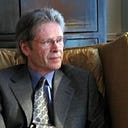Life Has No Opposite
When you walk through a forest that has not been tamed and interfered with by man, you will see not only abundant life all around you, but you will also encounter fallen trees and decaying trunks, rotting leaves and decomposing matter at every step. Wherever you look, you will find death as well as life. Upon closer scrutiny, however, you will discover that the decomposing tree trunk and rotting leaves not only give birth to new life, but are full of life themselves. Microorganisms are at work. Molecules are rearranging themselves. So death isn’t to be found anywhere. There is only the metamorphosis of life forms. What can you learn from this? Death is not the opposite of life. Life has no opposite. The opposite of death is birth. Life is eternal.
~ Eckhart Tolle
*
If you want to save the world, there is only one way to do it. First save yourself. You save yourself by accepting responsibility for yourself at every level.
What a child really needs is a mother and a father who are truly present. Only parents who know how to be fully present can give the child what it really needs.
— Leonard Jacobson
*
Perhaps the most spiritual thing any of us can do is simply to look through our own eyes, see with eyes of wholeness, and act with integrity and kindness.
— Jon Kabat-Zinn
*
‘Being spiritual’ is an inside job. It’s a process of taking responsibility for what’s going on inside our own thinking and feeling. Gaining clarity about who and what you really are makes you aware of your energy’s quality and how it affects others. You notice how easy it is to hurt other living beings just by not paying attention. What you don’t know about yourself form little time bombs that tend to explode at the worst possible moment.
We know that there are people who intentionally hurt others but most of us just commit sins of unconsciousness. We don’t realize how much pain we cause by being preoccupied by the stories we’re spinning inside our inner world. We live in a state of distraction. The world needs our attention, our presence, but we’re often born to parents who were absent emotionally and even physically, and that’s what we learn.
We learned very early to practice keeping a distance from ourselves. We conceive a yearning for presence, but we want it from others. We don’t know how to recapture that kind of calm and open attention we came into the world with and somehow lost before the age of ten.
There are ways to relearn presence. Sitting meditation and art making, for example, train you to pay attention to what’s going on right now. We can learn to recognize the difference between rumination and presence, between worry and presence and between planning the future or regretting the past and presence.
Once we start to notice our state of mind we’re surprised that we’re almost never in a state of presence. We pay very little attention to our actual lives and we raise our kids like our parents raised us, eternally preoccupied. Our usual mind state is distraction, which we encourage because we don’t like to be faced with our inner confusion. Inside us is an unknown world, a tangle of conflicts, old wounds and phobias that take up so much space there’s no room for presence.
A race of humans incapable of being present to themselves and the world are continually stumbling into wars and rumors of wars that seem to appear out of nowhere. We trace the fault to bad people acting badly, which is a bit of sleight-of-hand that gets us off the hook.
The responsibility to change this situation rests with those willing to confront themselves, kindly of course, and establish some inner clarity. Every individual who can create a clearing inside themselves is healing the world.
*
Volume four of my series Meditations on Living is now published on Amazon. If you read it, please leave a review.
Here’s one:
Insightful and eloquent musings on the human condition
A regular contributor on Medium, David Price’s articles caught my attention a couple of years ago. Combined with stunning artwork — some of which is his own — and often wonderful quotes from celebrated sources, his daily submissions became a fixture with my morning coffee. He combines an almost poetic prose with razor-sharp insights into the state of humanity and the world we’ve created. Time and again I’ve been thoroughly impressed by his views of the state of things, both the good and the bad, views that will often follow me around all day. This book is a collection of a number of his articles, and I highly recommend it.
*
It will look like this:
